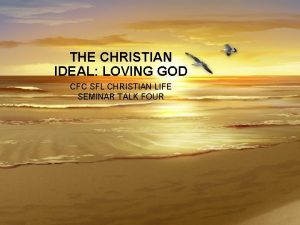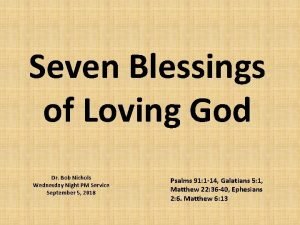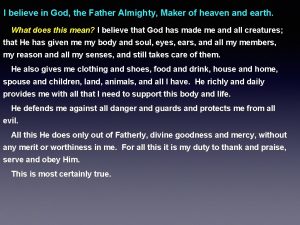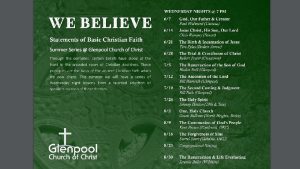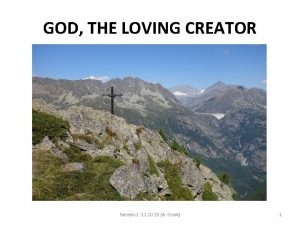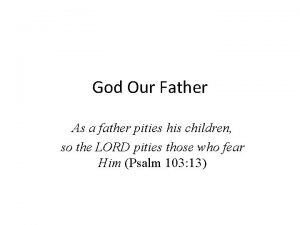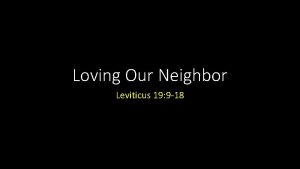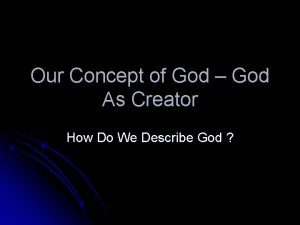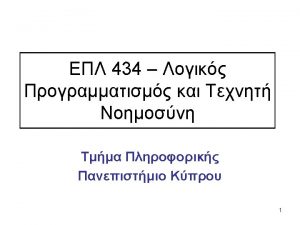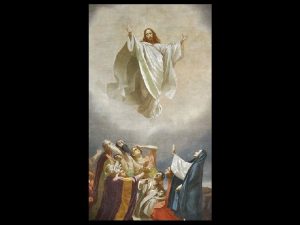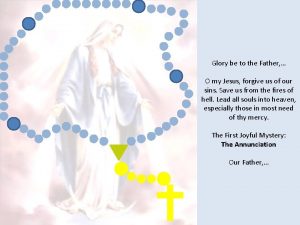Our Loving God Father and Creator Athiest no


















- Slides: 18

Our Loving God: Father and Creator

-Athiest - no God -Monotheistic - one God -Polytheistic - multiple gods -Deism - God with no interest in us -Agnostic - God’s existence can’t be known

1. Why did you accept or reject any of the statements? 2. Which of the statements must a Catholic believe? 3. Which statements are, in your judgement, clearly false? Why?

St. Thomas Aquinas’s “Proofs”: 1. The Unmoved Mover - Whatever is in motion, has to be moved by something else 2. First Cause - Nothing causes itself 3. Everything Comes from Something - Nothing can’t create something 4. Supreme Model - Perfect model of goodness, truth, beauty is the perfect being we call God 5. Grand Designer - He made it all

“Desire for God is written in the human heart, because man is created by God and for God” 1. An Unquenchable thirst for joy and happiness 2. An experience of beauty and truth 3. A sense of personal conscience, moral goodness and justice 4. Love

Scriptures stresses both God’s transcendence and immanence Transcendence - God’s total otherness and being infinitely beyond and independent of creation Immanence - God’s intimate union with and total presence to his creation

1. Do you feel that belief is God is reasonable? Explain 2. Which proof of God’s existence leaves you with the most questions? Which proof of God’s existence answers more of your questions? 3. Why do you believe in God?

-God is truly a mystery -Revelation means “unveiling” -Divine Revelation refers to this free gift of God’s self communication by which he makes known the mystery of his divine plan -Salvation History - account of God’s saving activity for mankind -Adam and Eve disobeyed God and committed the original sin

God established a series of covenants Bible records many covenants, most important ones are: 1. Covenant with Noah 2. Covenant with Abraham 3. Sinai Covenant 4. Jesus Christ, the New Covenant

1. How is a marriage covenant like a convenant between God and mankind? 2. How is Jesus’ coming the climax of history? 3. Name three ways that God has revealed himself to you.

God reveals himself through a single deposit of faith -Found in Sacred Scripture (Bible) and in in the Sacred. Tradition of the Church -Library of divinely inspired writings -firmly, faithfully, and without error teach that the truth which God wished to see confided to the Sacred Scriptures Sacred Tradition - living transmission or “handing on” of the Church’s gospel message

-God revealed his name to Moses Yahweh, “I am” -shows that God is not some impersonal force -God is onmipresent; he is everywhere -acknowledges God’s mystery

St. Thomas Aquinas’ nine attributes of God: 1. God is unique 2. God is infinite and omnipotent 3. God is eternal 4. God is immense 5. God contains all things 6. God is immutable 7. God is utterly simple 8. God is personal 9. God is holy

1. How does your name express who you are? 2. Which attribute of God is hardest for you to understand? Why? 3. Why is it appropriate to call God Father? 4. Tell about a loving human father you know who is like God.

God is the first person of the Blessed Trinity -central mystery of faith and the source of all other mysteries Jesus taught us to pray to Abba, our Father -It is right and proper to call God “Father” -God is beyond the biological distinction of male and female -We call God “Father” because Jesus teaches us to do that

Divine revelation teachers other truths about God’s creation: -God is totally beyond us but also present to us -God guides creation through divine providence -God created humans in his image and likeness God created us male and female out of love and for love -God is the creator of all that is seen and unseen -Though essentially good because God made us, humans are tainted with sin -Through Jesus Christ and by the power of the Holy Spirit, God invites us into a personal relationship

-Adam and Eve rejected God’s love, resulting in mankind’s loss of his friendship -Immediate loss of grace of original holiness and Justice received from God -Human nature is weakened and is subject to the inclination to sin (concupiscence) -Though original sin is inherited by all, it is not an actual sin we personally commit -God never abandoned his sinful creatures

1. Tell two ways that you recognize God in creation. 2. How can you show your gratitude to God for the many gifts he has given you? 3. Name some ways you can overcome the human inclination to sin.
 Our loving father prayer
Our loving father prayer God-given virtues that direct us to our loving, triune god.
God-given virtues that direct us to our loving, triune god. God-given virtues that direct us to our loving, triune god.
God-given virtues that direct us to our loving, triune god. God our father christ our brother
God our father christ our brother Blessed be the god and father
Blessed be the god and father Blessed be the god and father
Blessed be the god and father Gracious and merciful god
Gracious and merciful god Marvelous grace of our loving lord
Marvelous grace of our loving lord Oh god our heavenly father prayer
Oh god our heavenly father prayer If god were loving there would be no suffering
If god were loving there would be no suffering Christian ideal
Christian ideal Blessings of loving god
Blessings of loving god Almighty maker
Almighty maker I believe in god the father
I believe in god the father Creator god margaret rizza
Creator god margaret rizza For unto us a child is born
For unto us a child is born Our god is an awesome god vine
Our god is an awesome god vine Our god is an awesome god
Our god is an awesome god Our god is an awesome god medley
Our god is an awesome god medley










